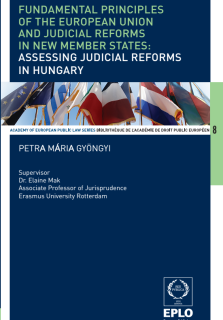
CONTENTS
I. INTRODUCTION
II. BACKGROUND, AIM AND APPROACH
II.1. In Search of a Legal Basis: Towards Content for the Fundamental Principle of the Rule of Law
II.2. Judicial Reforms in Hungary
II.2.a. Pre-accession Judicial Reforms and the Role of EU-Criteria
II.2.b. A Short Description of the Most Recent Judicial Reforms
II.2.c. Infringement Proceedings Started by the European Commission
II.2.d. The Role of the Venice Commission's Recommendations
II.2.e. Legislative Proposals Submitted by the Hungarian Government to the Venice Commission
II.3. Methodology
III. THE EU LEGAL BASIS OF STANDARDS FOR JUDICIAL ORGANIZATION IN NEW MEMBER STATES
III.1. EU-Criteria
III.2. Primary Law of the European Union: The Rule of Law Fundamental Value and the Charter of Fundamental Rights
III.3. Content Defined by the CJEU: The Meaning of a 'Court' under the Preliminary Ruling Case Law
III.4. Other European Standards
III.4.a. The European Court of Human Rights
III.4.b. Venice Commission: The Emergent Actor?
III.5. The Result: An Impressionist Picture
III.5.a. A 'Fill-in the Blanks' Legal Basis
for New Liberal-Democracies
III.5.b Proliferation of Networks
III.5.c. Cross-fertilization with Visible Brushstrokes
IV. DEVELOPING A THEORETICAL MODEL FOR THE OPTIMIZATION OF JUDICIAL ORGANIZATION: THE EXAMPLE OF CASE MANAGEMENT
IV.1. A General Model Depicting Judicial Organization in Liberal-Democracies
IV.1.a. The Liberal-Democratic Normative Framework for Judicial Organization: Fusion between Classic Rule of Law and New Public Management Principles
IV.1.b. Normative Part
IV.1.c. Implementation Part
IV.2. Elements of the Model Refined for New EU Member States
IV.2.a. Lessons Learnt from Judicial Reforms in New Liberal-Democracies
IV.2.b. Sensitive Elements: Factual Conditions
IV.2.c. The Importance of the Model
IV.3. Refining the Model for Case Management: Balancing the Principles of Organizational Autonomy and Functionality
IV.3.a. Organizational Autonomy
IV.3.b. The Principle of Functionality
V. APPLYING THE THEORETICAL MODEL TO JUDICIAL REFORMS IN HUNGARY
V.1. Role of Different Actors
V.2. Balance of Standards for Optimizing Case Management
VI. DISCUSSION
VII. BIBLIOGRAPHY





















